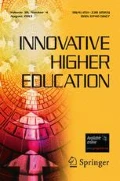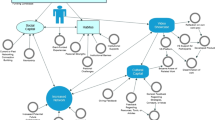Abstract
The benefits of professional networks are largely invisible to the people embedded in them (O’Reilly 1991), yet professional networks may provide key benefits for faculty careers. The purpose of the study reported here was to explore the role of professional networks in faculty agency in career advancement, specifically focusing on the overall relationship between the social capital gained from networks and faculty agency in career advancement. Findings suggest that off-campus networks are particularly important for faculty agency but that the benefits of networks may take time to develop.
Similar content being viewed by others
References
Archer, M. S. (2000). Being human: The problem of agency. New York, NY: Cambridge University Press.
Austin, A. E. (2010). Supporting faculty members across their careers. In K. J. Gillespie & D. L. Robertson (Eds.), A guide to faculty development (pp. 363–378). San Francisco, CA: Jossey-Bass.
Austin, A. E., & McDaniels, M. (2006). Preparing the professoriate of the future: Graduate student socialization for faculty roles. In J. C. Smart (Ed.), Higher education: Handbook of theory and research, XXI (pp. 397–456). Dordrecht, The Netherlands: Springer.
Baez, B. (2000). Race-related service and faculty of color: Conceptualizing critical agency in academe. Higher Education, 39, 363–391.
Baker, V. L., & Lattuca, L. R. (2010). Developmental networks and learning: Toward an interdisciplinary perspective on identity development during doctoral study. Studies in Higher Education, 35, 807–827.
Baldwin, R. G., Lunceford, C. J., & Vanderlinden, K. E. (2005). Faculty in the middle years: Illuminating an overlooked phase of academic life. The Review of Higher Education, 29, 97–118.
Bilimoria, D., Joy, S., & Liang, X. (2008). Breaking barriers and creating inclusiveness: Lessons of organizational transformation to advance women faculty in academic science and engineering. Human Resource Management, 47, 423–441.
Blackburn, R. T., & Lawrence, J. H. (1995). Faculty at work: Motivation, expectation, satisfaction. Baltimore, MD: Johns Hopkins University Press.
Blau, F. D., Currie, J. M., Croson, R. T. A., & Ginther, D. K. (2010). Can mentoring help female assistant professors? Interim results from a randomized trial. Cambridge, MA: National Bureau of Economic Research.
Bozeman, B., & Gaughan, M. (2011). Job satisfaction among university faculty: Individual, work, and institutional determinants. The Journal of Higher Education, 82, 154–186.
Brandes, P., Dharwadkar, R., & Wheatley, K. (2004). Social exchanges within organizations and work outcomes: The importance of local and global relationships. Group Organization Management, 29, 276–301.
Brass, D. J., Galaskiewicz, J., Greve, H. R., & Tsai, W. (2004). Taking stock of networks and organizations: A multilevel perspective. Academy of Management Journal, 47, 795–817.
Bryson, C. (2004). The consequences for women in the academic profession of widespread use of fixed term contracts. Gender, Work & Organization, 11, 187–206.
Burt, R. S. (1992). Structural holes: The social structure of competition. Cambridge, MA: Harvard University Press.
Campbell, C. M., & O’Meara, K. (2014). Faculty agency: Departmental contexts that matter in faculty careers. Research in Higher Education, 55, 49–75. doi:10.1007/s11162-013-9303-x
Cerecer, P. D., Ek, L., Alanis, I., & Murakami-Ramalho, E. (2011). Transformative resistance as agency: Chicanas/Latinas (Re)creating academic spaces. The Journal of the Professoriate, 5(1), 70–98.
Christakis, N. A., & Fowler, J. H. (2009). Connected: The surprising power of our social networks and how they shape our lives – how your friends’ friends’ friends affect everything you feel, think, and do. New York, NY: Little Brown & Co.
Creamer, E. G. (1998). Assessing faculty publication productivity: Issues of equity. ASHE-ERIC higher education report, no. 26(2). Washington, DC: George Washington University, Graduate School of Education and Human Development.
Dobrow, S. R., & Higgins, M. C. (2005). Developmental networks and professional identity: A longitudinal study. Career Development International, 10, 567–583. doi:10.1108/13620430510620629
Elder, G. H., Jr. (1994). Time, human agency, and social change: Perspectives on the life course. Social Psychology Quarterly, 57, 4–15.
Emirbayer, M., & Mische, A. (1998). What is agency? American Journal of Sociology, 103, 962–1023.
Ganz, M. (2010). Leading change: Leadership, organization and social movements. In N. Nohira & R. Khurana (Eds.), The handbook of leadership and practice (pp. 509–550). Danvers, MA: Harvard Business School Press.
Germain, L.J. (2012). “I have the power to change this”: College women’s agency and sexual assault. (Unpublished doctoral dissertation) University of Virginia, Charlottesville, VA.
Gonzales, L. D., & Rincones, R. (2008). The role of faculty in global society. Teacher Education and Practice, 21, 382–406.
Higgins, M. C. (2001). Changing careers: the effect of social context. Journal of Organizational Behavior, 22, 595–618. doi:10.1002/job.104
Higgins, M., & Kram, K. (2001). Reconceptualizing mentoring at work: A developmental network perspective. Academy of Management Review, 26, 264–288. Retrieved from http://www.jstor.org/stable/259122
Hurtado, S., Eagan, M. K., Pryor, J. H., Whang, H., & Tran, S. (2012). Undergraduate teaching faculty: The 2010-2011 HERI faculty survey. Los Angeles, CA: Higher Education Research Institute, UCLA. Retrieved from http://www.heri.ucla.edu/monographs/HERI-FAC2011-Monograph.pdf
Ibarra, H. (1993). Personal networks of women and minorities in management: A conceptual framework. Academy of Management Review, 18, 56–87. Retrieved from http://www.jstor.org/stable/258823
Ibarra, H., & Deshpande, P. (2004). Networks and identities: Reciprocal influences on career processes and outcomes. Working Paper Series – INSEAD (2004/85/OB). Retrieved from http://www.library.nyenrode.nl/INSEAD/2004/2004-085.pdf
Ibarra, H., Kilduff, M., & Tsai, W. (2005). Zooming in and out: Connecting individuals and collectivities at the frontiers of organizational network research. Organization Science, 16, 359–371. doi:10.1287/orsc.1050.0129.
Kezar, A. (2014). Higher education change and social networks: A review of research. The Journal of Higher Education, 85, 91–125. doi:10.1353/jhe.2014.0003
Kezar, A., & Lester, J. (2009). Supporting faculty grassroots leadership. Research in Higher Education, 50, 715–740.
Lin, N. (1999). Building a network theory of social capital. Connections, 22, 28–51. Retrieved from http://www.analytictech.com/mb874/lin-socialcapital.htm
Marshall, V. (2000, August). Agency, structure, and the life course in the era of reflexive modernization. Washington, DC: Paper presented at the annual meeting of the American Sociological Association.
Neumann, A. (2009). Professing to learn: Creating tenured lives and careers in the american research university. Baltimore, MD: The Johns Hopkins University Press.
Neumann, A., Terosky, A. L., & Schell, J. (2006). Agents of learning: Strategies for assuming agency, for learning, in tenured faculty careers. In S. J. Bracken, J. K. Allen, & D. R. Dean (Eds.), The balancing act: Gendered perspectives in faculty roles and work lives (pp. 91–120). Sterling, VA: Stylus Publishing.
O’Meara, K. A., & Campbell, C. M. (2011). Faculty sense of agency in decisions about work and family. Review of Higher Education, 34, 447–476.
O’Meara, K. A., & Niehaus, E. (2013, April). With a little help from my friends: The role of on and off-campus relationships in faculty careers. San Francisco, CA: Paper presented at the annual meeting of the American Educational Research Association.
O’Meara, K. A., Campbell, C. M., & Terosky, A. (2011). Living agency in the academy: A conceptual framework for research and action. Charlotte, NC: Paper presented at the annual meeting of the Association for the Study of Higher Education.
O’Reilly, C. A., III. (1991). Organizational behavior: Where we’ve been, where we’re going. Annual Review of Psychology, 42, 427–458.
Pifer, M. J., & Baker, V. L. (2013). Managing the process: The intradepartmental networks of early-career academics. Innovative Higher Education, 38, 323–337. doi:10.1007/s10755-012-9243-y
Polodny, J. M., & Baron, J. N. (1997). Relationships and resources: Social networks and mobility in the workplace. American Sociological Review, 62, 673–693.
Ponjuan, L., Conley, V. M., & Trower, C. (2011). Career stage differences in pre-tenure track faculty perceptions of professional and personal relationships with colleagues. The Journal of Higher Education, 82, 319–346.
Rawlings, C. M., & McFarland, D. A. (2011). Influence flows in the academy: Using affiliation networks to assess peer effects among researchers. Social Science Research, 40, 1001–1017. doi:10.1016/j.ssresearch.2010.10.002
Sagaria, M. D., & Dickens, C. S. (1997). Feminists at work: Collaborative relationships among women faculty. The Review of Higher Education, 21, 79–101. doi:10.1353/rhe.1997.0012
Seibert, S. E., Kraimer, M. L., & Liden, R. C. (2001). A social capital theory of career success. Academy of Management Journal, 44, 219–237. Retrieved from http://www.jstor.org/stable/3069452
Sen, A. K. (1985). Well-being, agency and freedom: The Dewey lectures 1984. Journal of Philosophy, 82(4), 169–221.
Steffen-Fleur, N. (2006, June). Advancing women faculty through collaborative research networks. Pittsburgh, PA: Paper presented at the annual conference of the Women in Engineering ProActive Network (WEPAN).
Terosky, A. L. (2005). Taking teaching seriously: A study of university professors and their undergraduate teaching. (Unpublished dissertation) Teachers College, Columbia University, New York, NY.
Tierney, W. G., & Bensimon, E. M. (1996). Promotion and tenure: Community and socialization in academe. New York, NY: State University of New York Press.
Trower, C. A. (2012). Success on the tenure track: Five keys to faculty job satisfaction. Baltimore, MD: Johns Hopkins University Press.
Valian, V. (1998). Why so slow: The advancement of women. Cambridge, MA: MIT Press.
Williams, B., & Williams, S. (2006). Perceptions of African american male junior faculty on promotion and tenure: Implications for community building and social capital. The Teachers College Record, 108(2), 287–315.
Acknowledgments
We gratefully acknowledge the helpful comments provided by the anonymous reviewers on earlier drafts of this manuscript. We further recognize this article is based upon work supported by the National Science Foundation under Grant No. HRD-1008117.
Author information
Authors and Affiliations
Corresponding author
Rights and permissions
About this article
Cite this article
Niehaus, E., O’Meara, K. Invisible but Essential: The Role of Professional Networks in Promoting Faculty Agency in Career Advancement. Innov High Educ 40, 159–171 (2015). https://doi.org/10.1007/s10755-014-9302-7
Published:
Issue Date:
DOI: https://doi.org/10.1007/s10755-014-9302-7




